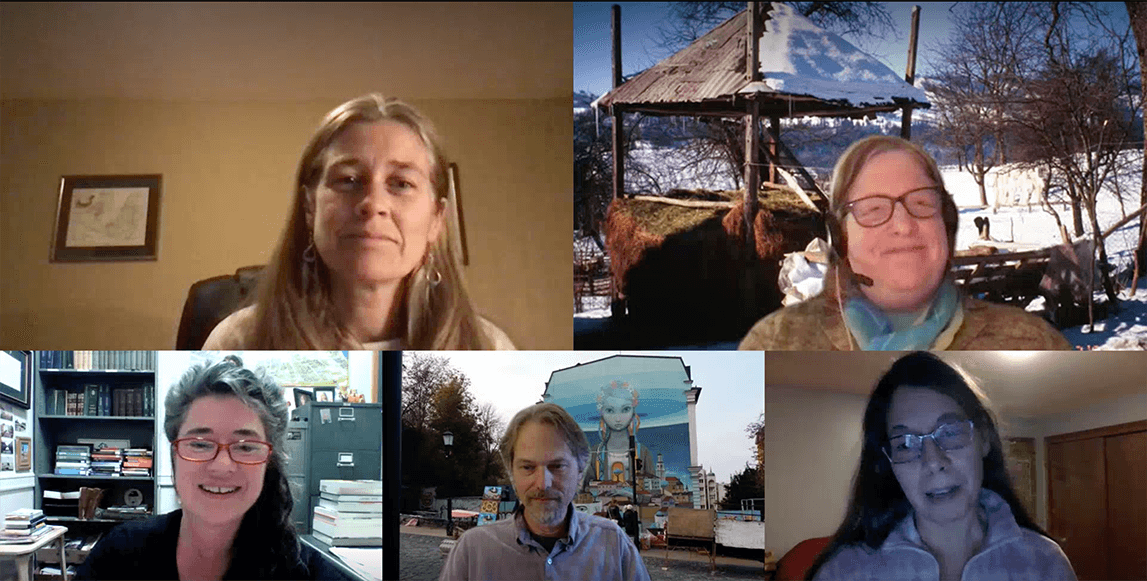UVM experts in Ukrainian-Russian affairs are concerned about Russian President Vladimir Putin’s mental state as his invasion of Ukraine deviates from his typical foreign affairs playbook.
That was the consensus among the faculty experts at a teach-in Feb. 28 hosted by the Honors College.
“Once he invaded, and since then, I’ve really begun to wonder, ‘Has he lost it?’” said panelist Michele Commercio, a professor specializing in Russia and central. “Is he paranoid? Has he been shut out during the pandemic?”
Commercio appeared alongside Professor Adrian Ivakhiv, an expert in Ukrainian politics and cultural identity; Professor Jennifer Dickinson, who specializes in linguistics and economic anthropology specific to Ukraine; and Professor Kathleen Scollins, who teaches Russian language and literature.
They discussed the context and possible forecasts for the invasion, emphasizing the inconsistencies with Putin’s current and historical foreign policy.
Commercio said that with respect to Putin’s history, the invasion of Ukraine is a “dramatic deviation from his playbook.”
Russia has long facilitated seemingly unresolvable territory disputes to block post-Soviet states from fraternizing with the West, Commercio said.
Around the turn of the century, the Kremlin dealt with the Western inclinations of Georgia and Moldova by starting and supporting succession wars within the regions, additionally recognizing these separatist territories as independent, Commercio said.
Russia recognizes the independence of the Abkhazia and South Ossetia regions in Georgia, and backs a pro-Russia regime in Transnistria, a breakaway province of Moldova, sucking both nations into a geopolitical gray zone between the east and west.
Commercio said these moves increase the likelihood that Georgia and Moldova will never join NATO; it is near impossible for the international body to accept states with territorial integrity challenges.
The panelists argued that if Putin was acting as he historically does, he would have stopped the invasion and gone to negotiations after recognizing the independence of the Donetsk and Luhansk regions in Ukraine a few days into the campaign.
Commercio said that before the invasion, she assured her colleagues and students that it was incredibly unlikely for Russia to actually invade. She states that Putin “always goes up to (the red line) but never crosses it.”
Putin had two primary demands as he was amassing troops around the Ukrainian border — he wanted assurance that NATO would never accept Ukraine, and that NATO would cease military actions in Central and Eastern Europe and Central Asia. Commercio called these “pipe dream demands,” which Putin himself knows will never be satisfied.
So, what does he really want?
Putin appears to have two primary goals: mitigate Western influence around his borders and reunite what he sees as a collective Russian people.
The Kremlin's media and propaganda machine has been treating this war distinctly from the Chechen wars, Scollins said. The Kremlin had been slowly bolstering its propaganda campaigns as the invasion approached, she said, but here Putin has to do a double function: he has to promote Russians and Ukranians as a single Slavic family while still inspiring war against one half of that culture.
“In his narrative, Ukraine is a severed fragment of Russia,” Scollins said.
Putin has wielded a metaphor of contagion against the Ukranian people, she said, espousing a narrative that Ukrainian society has been infected with a nationalistic bug that shows itself in neo-Nazis and government-sponsored genocide.
“It allows him to simultaneously keep the Ukrainian population clean,'' Scollins said, explaining that Putin is justifying the war to rid fellow Slavic people of a metaphorical disease.
Ivakhiv mentioned a 5,000-word essay Putin wrote last summer on the history of unity between the two nations. The professor argued the work is full of “pseudo-historical fantasies” that assert Russians need to come in and save their Ukrainian brethren. Ivakhiv called the narrative Putin’s “neo imperialist interpretation of history.”
Putin considers the fall of the Soviet Union a grand mistake and loss of a collective people, Ivakhiv said, and now “there’s a kind of emotionality to his delivery.”
